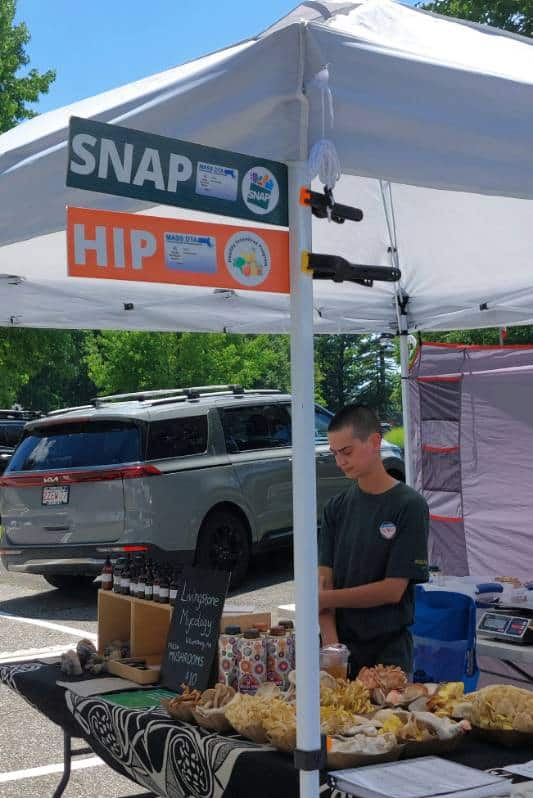A sign letting shoppers know a farmer’s market vendor participates in the state’s Healthy Incentives Program.
Reminder Publishing file photo
Throughout Massachusetts, 175,000 households receive financial assistance to help purchase produce from approved farms, farmer’s markets and stores. As of Dec. 1, however, many are receiving much less.
The Healthy Incentives Program is a complimentary benefit of the Supplemental Nutrition Assistance Program. Everyone enrolled in SNAP is eligible for HIP. Through the program, people can purchase produce and receive reimbursement on their EBT card. Until recently, the reimbursement amount depended on the size of family, with a cap of $80 per month.
“HIP is a unique program, nationally,” and “a point of pride” for Massachusetts, said Claire Morenon, communications manager at Community Involved in Sustainable Agriculture, a nonprofit that encourages people to buy local produce by supporting Pioneer Valley farms and programs that provide food access for all. “It’s about both supporting our food system and making sure low-income people have access to healthy foods. It’s your classic win-win.”
However, as of Dec. 1, the monthly reimbursement amount has been reduced to $20, regardless of family size.
“We know how critical the Healthy Incentives Program is to families and farmers in Massachusetts,” said Commissioner Jeff McCue of the state Department of Transitional Assistance, which administers HIP. “We are restructuring the program to ensure it can continue to operate year-round within the current funding level, to allow ongoing support for families and farmers to plan.”
A fully funded HIP program costs $25 million, but $15 million was included in the fiscal year 2025 budget. However, state Sen. Jake Oliveira (D-Ludlow) said Gov. Maura Healey’s administration did not make it clear during the budget process that $15 million would not be enough to fund the program without cuts.
The Department of Transistional Assistance’s stated position is that the cuts were structured to cause the least disruption to recipients and farmers and that reducing the monthly benefit to $20 was the only viable option to ensure year-round benefits.
Oliveira said half of HIP beneficiaries are seniors and one-third are people with disabilities. “[HIP] helps our farmers, helps our seniors and helps the people of Western Massachusetts. It’s been an enormous success,” he said.
The cuts are “completely disheartening,” Oliveira said, “especially as we get into the holiday season. This is a hit to people’s bottom line.” Morenon called it a “gut punch” for families trying to provide holiday meals for their families. However, she said that she could see the argument that produce is mostly ready for harvest in the warm-weather months, so the winter is the least impactful time to cut benefits. On the other hand, Oliveira said, “You can get fruits and vegetables throughout the year. Farmers markets don’t go away.”
Oliveira said the impact of the HIP cuts will be felt throughout the region. “Obviously, [the cuts] are going to affect people here in Western Massachusetts, but it also affects local farms. We have great produce providers up and down the valley and some are family-owned.”
Morenon, likewise, said there would be long-term impacts affecting both farmers and the people who purchase produce through HIP.
Twenty dollars’ worth of produce may not be worth the cost for low-income people to travel to farmers markets them, causing them to forfeit their benefit completely, she said. Meanwhile, Morenon said, “Farmers markets that have been set up in low-income areas — a cut in [customers’] benefits may make it harder to justify traveling to set up at those places.”
CISA organized the Campaign for Healthy Incentives Program Funding, which raises awareness and helps put people in touch with their legislators and Gov. Maura Healey’s office. She added, “The Western Mass. legislative contingency is very supportive of HIP. We’re very lucky.”
The delegation sent letters urging restored funding of HIP to the Healey administration and the leadership in the state House of Representatives and Senate. Oliveira said the Legislature is working on a supplemental budget. “It is my hope that we can infuse some money into this program,” he added.
On a related note, Oliveira said he helped secure $100,000 for the Senior Farm Share program, which runs throughout the three counties in the Pioneer Valley.
Looking forward at the program’s future, Oliveira said, “Fiscal year [2026] doesn’t look as rosy as previous years.” He cited an expected reduction in federal dollars from the incoming presidential administration and lower state revenue.
The state provides tips for getting the most out of SNAP benefits at mass.gov/guides/get-the-most-out-of-your-snap. A map of current vendors participating in HIP, searchable by zip code, can be found at buylocalfood.org/hip-map.


